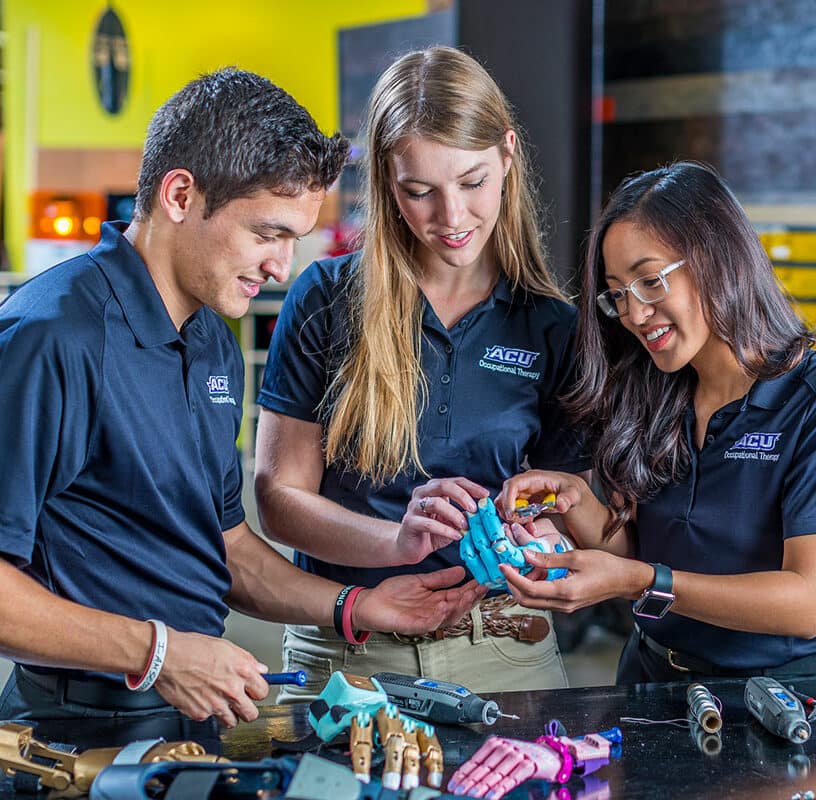All Degree Programs

The Department of Occupational Therapy offers both a Master’s of Science degree in Occupational Therapy and a Doctor of Occupational Therapy degree. Each of these degree programs combines rigorous academic study with extensive fieldwork placements and prepares you to sit for the National Board Certification Examination for Occupational Therapists (NBCOT) and to apply for licensure as an occupational therapist in the state in which you intend to practice.
The Doctor of Occupational Therapy further equips you for specialized focus within the field of occupational therapy, providing training in research and advanced techniques and building the skills to lead and uplift the capabilities of others.
Overview
The Department of Occupational Therapy was founded at Abilene Christian University in 2014 and accepted its first class of students into the Master of Science in Occupational Therapy (MSOT) degree in the fall of that year.
In the fall of 2021 ACU accepted its first class of students into the entry level OTD program. The department core values are woven throughout each curriculum and together make the ACU MSOT and OTD programs unique.
Faith– Belief, unseen, that transforms and transpires into belief in community, individuals and God, the Father of Jesus Christ.
Our view of humanity is grounded in the belief that humans are created by God in his image and for his glory. God, as our Maker, has allowed each individual to exhibit a wide array of skills, interests, and values shaped by their own culture, environment, and beliefs. Our belief in the equality of all humans is based on biblical values in that we are all one in Christ. We believe in the sanctity of human life and that each person is deserving of dignity and love regardless of their gender, race, nationality, or physical/mental capabilities. It is actually through human diversity we see the true nature of our Creator.
Expressions of faith are prominent in our teaching. Gatherings are opened with prayer and the relationship between the practice of occupational therapy and the Christian mission to love one another is expressed.
Service – Utilizing one’s gifts and education to aid, enable, and inspire individuals, community and society.
The Department of Occupational Therapy is deeply networked into the Abilene community. Coursework includes service to the community with an occupational perspective. Service is also a routine part of student activities through our Student Occupational Therapy Association. Through such service our students develop connections with Abilene and we have a growing number of alumni who have become occupational therapy practitioners in the area.
Authenticity – Genuine acknowledgement and acceptance of self, reflected in honest contributions and interactions with society.
Authenticity begins with evidence-based practice. The understanding and use of evidence permeates our curricula. Authenticity extends into personal action and is incorporated in our teaching of ethics, our teaching of responsibility for professional development beyond graduation and moves beyond self into the veracity required to manage and lead others.
Innovation – Creating new approaches, ideas, or tools that benefit self, community, and/or society.
For occupational therapy practitioners innovation springs from an intuitive understanding of human activity and how to match the resources and demands of the environment with the capacities of the person. This innovation process is fostered through our coursework in design theory in tandem with ACUs Maker Lab. In this creative space students learn and apply design theory to physically manufacture products that answer human needs. Tools include instruction on how to use 3D printers and other construction materials. Innovation also occurs in the realm of the mind. Our programs train students in the efficient use of research and partnered scholarship with a faculty mentor is an expectation of the OTD program
Competency – The state of being able to apply, do, and/or articulate a task or skill with accuracy and quality.
We believe the true test of competency lies in action in the real world. Thus our curricula include three 40 hour level I fieldwork experiences in settings that align with occupational therapy practice. These begin in the second semester of the programs. Students are placed with the adult population in spring, mental health in summer and pediatric populations in the fall. These are followed by two 12 week Level II fieldwork placements. Fieldwork sites are arranged by the Academic Fieldwork Coordinator in consultation with each student. The first fieldwork rotation occurs in the second spring semester of the program and students receive online support from advising faculty as they transfer into on the job learning. Students return to campus for the month of April to prepare for their transition into the profession and complete coursework in leadership and professional responsibility. The second fieldwork is completed over the summer.
Servant Leadership – Authority gained by actions based on a desire to serve the needs of others as modeled by Christ.
Additional mentorship and training in the knowledge, attitudes and skills of servant leadership is incorporated throughout the OTD program. Mentors in an area of specialization are assigned in the first semester and nurture leadership growth through a series of doctoral seminars. This culminates in the final semester with a focused course on leadership.
